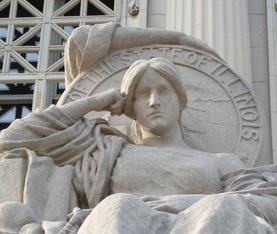 The Appellate Court of Illinois, First District, recently held that the form foreclosure complaint provided by the Illinois Mortgage Foreclosure Law (IMFL) complies with procedural due process guarantees of the Fifth and Fourteenth Amendments of the United States Constitution, and does not violate the Illinois Constitution’s separation of powers doctrine by usurping the Illinois judiciary’s rulemaking power.
The Appellate Court of Illinois, First District, recently held that the form foreclosure complaint provided by the Illinois Mortgage Foreclosure Law (IMFL) complies with procedural due process guarantees of the Fifth and Fourteenth Amendments of the United States Constitution, and does not violate the Illinois Constitution’s separation of powers doctrine by usurping the Illinois judiciary’s rulemaking power.
A copy of the opinion in Wells Fargo Bank N.A. v. Bednarz is available at: Link to Opinion.
A mortgagee foreclosed on the defendant borrower’s residential property. The mortgagee’s complaint tracked a form complaint set forth in section 1504(a) of the IMFL. Section 15-1504(c) of the IMFL enumerates multiple allegations that are “deemed and construed” to be included in form complaints.
The defendant borrower filed a 735 ILCS 5/2-615 motion to dismiss arguing that the form allegations contained in section 15-1504(c) of the IMFL violate procedural due process guarantees of the United States Constitution and the separation of powers doctrine of the Illinois Constitution.
The lower court denied the borrower’s motion to dismiss and entered summary judgment for the lender. The borrower appealed challenging solely the denial of the motion to dismiss.
The Appellate Court explained that the 12 allegations that are “deemed and construed” to be included in the form complaints “take a number of innocuously and uncontested issues out of play” and “help form a balance between a lender’s interest that a foreclosure case not be bogged down by formalistic proofs over noncontroversial matters, and a mortgagor’s interest in preserving his property.”
The Appellate Court first considered the borrower’s argument that the allegations under section 15-504(c) of the IMFL are not specifically included on the face of the complaint, and therefore are hidden from unsuspecting defendants leaving them unaware of the claims they must defend.
In its rejection of this argument, the Court noted the requirements for raising a facial constitutional challenge.
The Appellate Court explained that a party must show that he “has sustained or is in immediate danger of sustaining a direct injury” from the enforcement of the statute. In addition, the injury must be “distinct and palpable” and the statute must be unconstitutionally applied to the complaining party rather than “third parties in hypothetical situations.”
The Court noted that the borrower’s motion to dismiss did not address the effect of section 15-504(c) of the IMFL as applied to him, but rather the prejudicial effect on a hypothetical “common defendant” that may not be aware of the implied allegations.
Accordingly, the Appellate Court held that the borrower lacked standing to assert a facial constitutional challenge to section 15-504(c) of the IMFL because he failed to allege that he sustained, or was in immediate danger of sustaining, a direct injury as a result of the enforcement of the statute.
The Court also disagreed with the borrower’s argument that section 15-504(c) of the IMFL violated the separation of power’s doctrine of the Illinois Constitution because the legislature usurped “the court’s power to determine what allegations are sufficient to state a claim for mortgage foreclosure.”
The Appellate Court noted that it is well established that the “legislature has authority to impose requirements upon the judiciary governing matters of procedure and the presentation of claims.” The test of whether such an enactment is an unconstitutional infringement is whether the requirements imposed by the legislature “unduly encroach upon the judiciary’s function or conflict with any of the supreme court’s rules.”
The Court further explained that Illinois Supreme Court Rule 1 states that Illinois’ Civil Practice Law and Code of Civil Procedure, along with the court rules, govern trial court proceedings. As the procedures contested by the borrower are set forth in Article 15 of the Civil Practice law, mortgage foreclosure actions are governed by legislative enactment and Illinois Supreme Court Rule 1. Therefore, the Court held, the enactment and the rules are complementary rather than conflicting.
The Appellate Court further noted that the borrower failed to allege that section 15-504 of the IMFL encroaches on the judiciary’s power to determine the sufficiency of a foreclosure complaint. Therefore, the Court found that section 15-504(c) of the IMFL was not an unconstitutional legislative encroachment.
Accordingly, the Appellate Court affirmed the circuit court’s ruling rejecting the borrower’s arguments.


